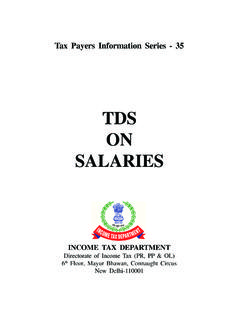Transcription of Taxation of - Income Tax Department
1 Tax Payers Information Series 31 Taxation ofSalaried Employees,PensionersandSenior CitizensINCOME TAX DEPARTMENTD irectorate of Income Tax (PR, PP & OL)6th Floor, Mayur Bhawan, Connaught CircusNew Delhi-110001 This publication should not be construed as anexhaustive statement of the Law. In case of doubt,reference should always be made to the relevantprovisions of the Income Tax Act, 1961, Income TaxRules, 1962, Wealth Tax Act, 1957 and Wealth TaxRules, 1957 and wherever necessary, to Notificationsissued from time to 1An Introduction to Taxation1 Chapter 2 Salary Income .
2 Perquisites & Allowances16 Chapter 3 Overview of Income from House Property30 Chapter 4 Overview of Capital Gains33 Chapter 5 Deductions under Chapter VIA39 Chapter 6 Tax Rebate & Relief51 Chapter 7 Permanent Account Number55 Chapter 8 Taxability of Retirement Benefits57 Chapter 9 Pensioners & Senior Citizens63 Chapter 10 Taxation of Expatriates66 Chapter 11 Income tax on Fringe Benefits72 Chapter 12 Some relevant Case laws75 CHAPTER 1AN INTRODUCTION TO INTRODUCTIONI ncome tax is an annual tax on Income . The Indian IncomeTax Act (Section 4) provides that in respect of the total Income ofthe previous year of every person, Income tax shall be charged forthe corresponding assessment year at the rates laid down by theFinance Act for that assessment year.
3 Section 14 of the Income -tax Act further provides that for the purpose of charge of incometax and computation of total Income all Income shall be classifiedunder the following heads of from house and gains of business or from other total Income from all the above heads of Income iscalculated in accordance with the provisions of the Act as theystand on the first day of April of any assessment this booklet an attempt is being made to discuss the variousprovisions relevant to the salaried class of taxpayers as well aspensioners and senior FILING OF Income TAX RETURNS ection 139(1) of the Income -tax Act, 1961 provides thatevery person whose total Income during the previous year exceededthe maximum amount not chargeable to tax shall furnish a returnof Income .
4 The Finance Act, 2003 has introduced Section 139(1B)which provides for furnishing of return of Income on computerreadable media, such as floppy, diskette, magnetic cartridge tape,2CD- ROM etc., in accordance with the e-filing scheme specifiedby the Board in this return of Income can be submitted in the following manner:(i)a paper form;(ii)e-filing(iii) a bar-coded paper the return is furnished in paper format,acknowledgement slip attached with the return should be duly filledin. Returns in new forms are not required to be filed in can be e-filed through the internet. E-filing of returnis mandatory for companies and firms requiring statutory audit u/s44AB.
5 From 2011-12, it is now also mandatory for all businessentities (including individuals/HUF) liable to tax audit to e-file theirreturn of Income . E-filing can be done with or without digital signature-a)If the returns are filed using digital signature, then nofurther action is required from the tax )If the returns are filed without using digital signature,then the tax payers have to file ITR-V with thedepartment within 15 days of )The tax payer can e-file the returns through ane-intermediary also who will e-file and assist him in filingof ITR-V within 15 )e-Filing has been made compulsory for for an individual and HUF having annual incomeof more than Rs.
6 10 Lakhs. These persons will have toelectronically file return, for which digital signature arenot the return of Income is furnished by using bar codedpaper return, then the tax payers need to print two copies of FormITR-V. Both copies should be verified and submitted. The receivingofficial shall return one copy after affixing the stamp and notification dated 2012, e-filing has been madecompulsory for 2012-13 onwards for an individual/HUF if thetotal Income during the previous year exceeds Rs. 10 lakh. Howeverdigital signature is not mandatory for these tax payers and they cantransmit the data electronically and there after submit the verificationof return in Form ITR-V.
7 Filing of return electronically under digitalsignatures is mandatory for any individual required to submit returnin ITR-4 and to whom provisions u/s 44AB are from faster refunds, through e-filing, one can also availof some value added services such as viewing tax credit status (Form26AS), tracking of refunds emails/SMS alerts for processing statusetc. Vide notification dated e-filing has how been mademandatory for individuals & including salaried taxpayers earningmore than Rs 5 lakh taxable Income during the Finance Act, 2005 has provided that person shall file a return of Income on or before the relevantdue date even if his total Income without giving effect to theprovisions of Chapter VI-A (please see Chapter 5 of thisbooklet) exceeds the maximum amount not chargeable to Central Board of Direct Taxes has notified the schemefor exempting salaried taxpayers with total Income up to Rs.
8 5lakhs from filing Income tax return for Assessment Year 2011-12,which will be due on July 31, 2011. Individuals having total incomeup to Rs. 5,00,000 for FY. 2010-11, after allowable deductions,consisting of salary from a single employer and interest incomefrom deposits in saving bank account up to Rs. 10,000 are notrequired to file their Income tax return. Such individuals must reporttheir Permanent Account Number (PAN) and the entire incomefrom bank interest to their employer, pay the entire tax by way ofdeduction of tax at source and obtain a certificate of tax deductionin Form No.
9 16. Persons receiving salary from more than oneemployer, having Income from sources other than salary and interestincome from a saving bank account or having refund claims shallnot be covered under the scheme. The scheme shall also not beapplicable in cases where in notices are issued for filing the incometax return under section 142(1) or Section 148 or Section 153A orSection 153C of the Income Tax Act, may be noted that CBDT has clarified that the aboveexemption from filing of return was available only for and 2012-13. Hence, this exemption for salaried tax payershaving total Income upto Rs.
10 5 lakh is NOT extended DUE DATES FOR PAYMENT OF ADVANCE TAX &FILING OF RETURNL iability for payment of advance tax arises where the amountof tax payable by the assessee for the year is ,000/- or due dates for various instalments of advance tax are givenbelow:DUE DATEAMOUNT PAYABLE(i) On or before 15th SeptemberAmount not less than 30%of the previous yearof such advance tax payable(ii) On or before 15th December Amount not less than 60%of the previous yearof such advance tax payable(iii) On or before 15th March ofEntire balance amount ofthe previous yearsuch advance tax payableAlso, any amount paid by way of advance tax on or before31st March is treated as advance tax paid during the Financial due date of filing of return of Income in case of salariedemployees is 31st of July.
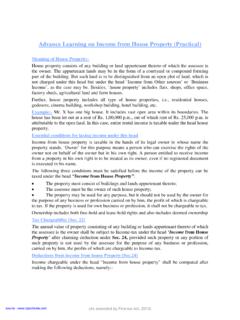
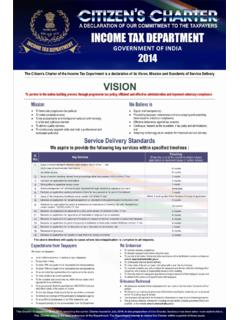
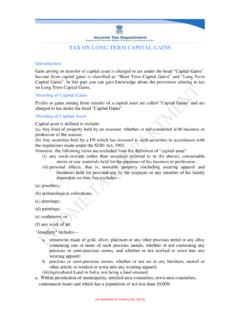
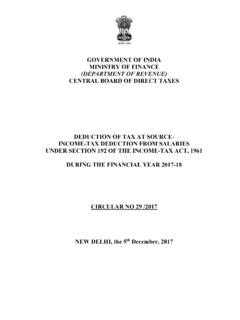

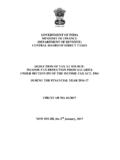
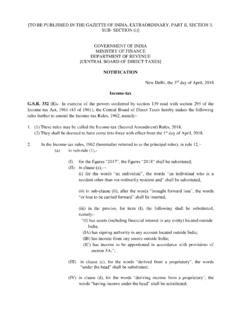
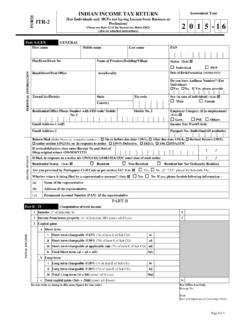
![FORM NO. 3CA [See rule 6G(1)(a)] Audit report …](/cache/preview/5/e/9/7/6/b/7/4/thumb-5e976b74d05a63207c471fc48a86f3e5.jpg)
